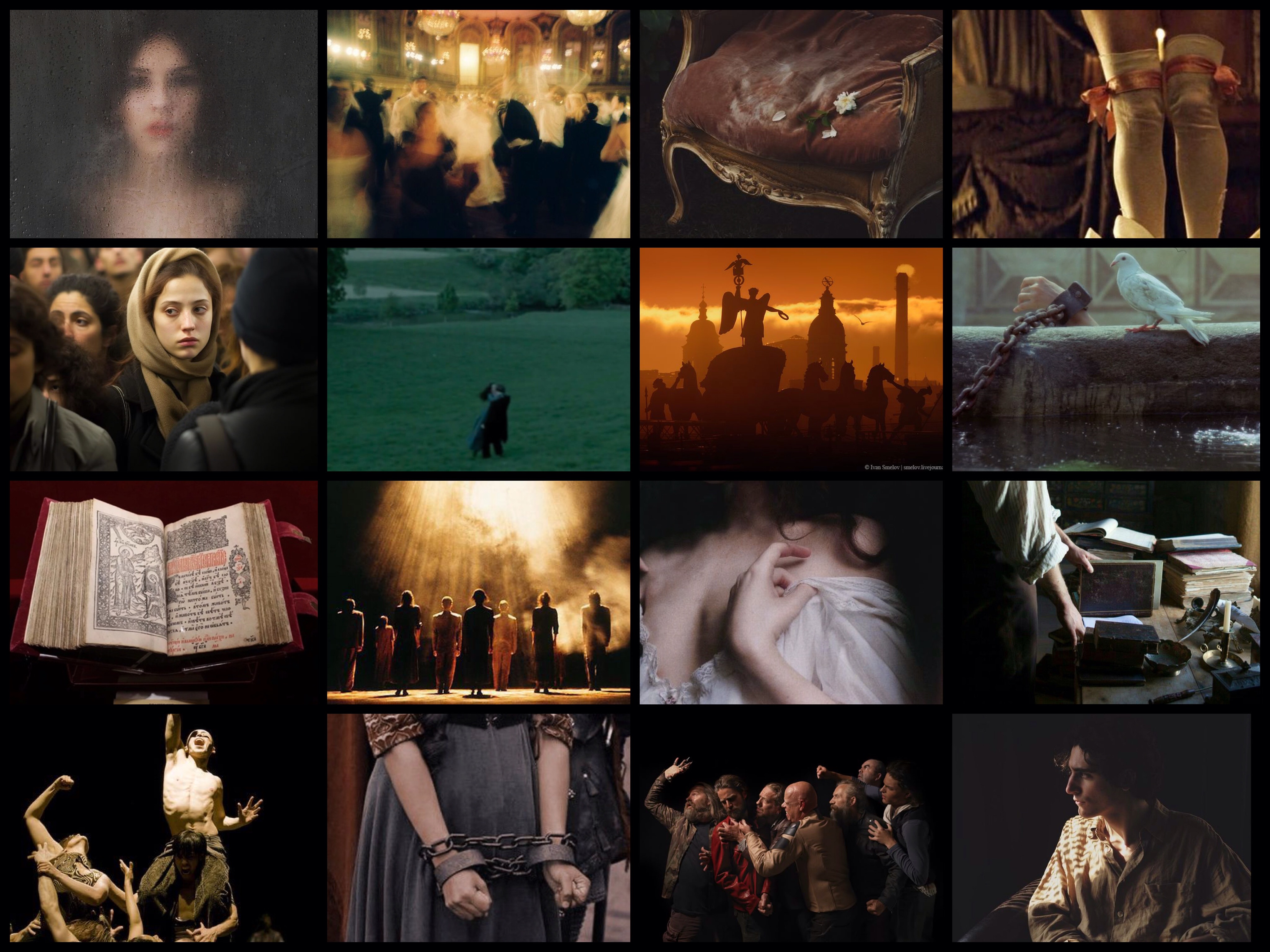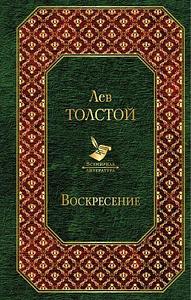Take a photo of a barcode or cover
challenging
dark
reflective
sad
medium-paced
Plot or Character Driven:
A mix
Strong character development:
Yes
Loveable characters:
Yes
Diverse cast of characters:
Yes
Flaws of characters a main focus:
Yes

Так почему же мы читаем классику?
Классическая литература — для нашего общества это не только наследие прошлого, это инструмент осознания настоящего. Мы читаем классику сейчас не ради эстетики старинного, порой витиеватого слога, не чтобы «быть культурными» и поставить себе галочку о прочтении кого-то именитого, а чтобы лучше понимать людей, общество и самих себя, видеть через историю прошлого, что ждёт нас в настоящем и будущем, — вот то, что не хотелось бы, чтобы возвращалось, к нам возвращается. И такие книги, как «Воскресение» Льва Толстого, опять не устаревают, а даже становятся актуальными, потому что в них — суть не только человеческой природы, но и суть устремлений политики. Лев Толстой, может, и писал в своё время про постоянные вызовы, с которыми сталкивается каждый: вина и искупление, страх и совесть, равнодушие и пробуждение, — но для нас это как подготовка к тому, что будет, как к зомби-апокалипсису: надо быть готовым и надеяться, что этого не произойдёт.
Кратко напомню, о чём история, и пойду разбирать дальше произведение на то, что прибывает теперь с нами из века девятнадцатого. Это история о князе Нехлюдове, который однажды встречает в зале суда Катюшу Маслову — женщину, которую он когда-то соблазнил и бросил. Она теперь обвиняемая, он — присяжный заседатель. Вот в этот момент и рушится его привычный мир. Он начинает видеть — и в себе, и в окружающей действительности — ложь, грязь, несправедливость, от которых он ранее отмахивался. Этот внутренний сдвиг — то самое «воскресение», пробуждение души, которая начинает искать правду, пытается исправить содеянное и понять, как жить дальше. Это основное, но есть и ветки в этой истории, которые как раз проистекают из того, что герой пытается смотреть и не отворачиваться. Правда, что со всем этим делать, он вообще не знает, и дела, честно говоря, до конца не доводит.
Ну, так и кто же у нас Нехлюдов?
Нехлюдов — обеспеченный, немного скучающий человек, живущий в своём комфортном мире. Который ест яблоко и смотрит в окно (это цитата из кинофильма «Король-олень», если не вспомнили — посмотрите фильм, он шикарный). Он нарушил чью-то судьбу — и забыл. Но в какой-то момент прошлое возвращается в лице конкретного человека: Кати Масловой, обвиняемой в суде. Это пробуждает его от привычной, удобной апатии.
Разве это не узнаваемо сегодня? Сколько раз мы закрываем глаза на то, что видеть неудобно или больно. И иногда отделываемся, если всё же это как-то в глаз нам попадает: «Ну, это не моя проблема». И мы считаем это нормальным — хотя бы потому, что представления не имеем, что с этим делать, как это изменить. Да и никто из нас не революционер. А только они, как и показывает нам роман, — именно те люди, которые оставляют себя и борются за людей и их жизни. А то, что хоть немного делаем мы, то как Нехлюдов — порой и объяснить не можем, и где-то бросить можем, потому что другие дела как бы.
Мы — современные Нехлюдовы, пока сами не попадём в оборот системы, любого вида несправедливости. Ну и да, надеемся, что оно как-то само рассосётся, ну или боженька поможет. (Всё же концовка романа — это для меня "рука-лицо", честно, но досадно.)
Катюша Маслова — голос сломленных.
Катюша в романе — не просто пострадавшая. Она — образ тех, кто оказался на «дне» из-за безразличия общества, системы, моральной халатности других. Сегодня таких Катюш — тысячи. Общество часто говорит: «Сама виновата». Но Толстой буквально кричит с каждой страницы: «Нет! Система виновата, равнодушие, ложь, жестокость. А человек — это человек, он не перестаёт им быть из-за ошибки или падения». И дополнительно показывает нам, что человек стремится быть лучше. Всегда.
Кстати, это не только художественный образ — это реальная действительность: человек даже на «дне» стремится быть лучше, прочитайте Ахто Леви "Записки Серого Волка" и убедитесь в этом. История-то реального человека, и людей рядом с ним — тоже реальных. Просто кто-то даже на «дне» находит в себе силы, а кому-то, как Катюше, нужен пинок, тот, за кого зацепится — и поднимется.
Ну и в оправдание такого действия очень хорошо видно по рассказу о Катюше, как человек нуждается в школе, в объяснениях. Потому что, даже имея хоть маломальское образование, тяму ему не хватает оглядеть всё вокруг, сопоставить, вырасти. Этому надо учиться, этому надо обучать. И если человек, обучаясь, умеет ухватывать и обрабатывать то, что ему говорят — это показывает его желание быть человеком, а не присосочкой. Да, Катюше нужно было зацепиться, но дальше-то она — сама, сама. И это было красиво.
Поэтому Катюша в истории не просто жертва — она сила. Она отказывается прощать Нехлюдова, пока не почувствует искренность. И в этом — её достоинство. Современные жертвы тоже не хотят жалости. Им нужна справедливость. Признание. Равное отношение.
«Что делать?» — вопрос на все времена.
Нехлюдов раскаивается и начинает действовать. Ну как действовать... Его, скорее, заставляют действовать просьбы людей. Да и вообще, если бы не люди, которые встали перед ним, он, может, дальше Катерины и не смотрел бы. Да, он едет с Масловой в ссылку. И эта поездка ему многое из жизни людей открывает. Вот только беда в том, что Нехлюдов едет, не совсем понимая зачем. У него в голове только одна цель — сделать себя благородным, в истории быть в белом пальто. Он если и помогает кому-то, если что-то подмечает — то лишь по накатанной, не имея желания понимать, видеть, пытаться это действительно решить. У него в голове как будто не меняется то, что было написано в книгах, с тем, что он видит перед собой, как будто он не переоценивает, не продумывает ничего дальше — живёт вот здесь и сейчас, и страдает здесь и сейчас, переживает здесь и сейчас. Ему кажется, что он сменил образ жизни. Но на самом деле — нет.
Но хотя бы из того, что показывает нам Толстой, мы видим, что именно действие — это сила. А не эмоционирование и «обнимаю» с раскрашиванием аватарок. То есть уже тем, что Нехлюдов встал с дивана и хоть одну бумагу хоть куда-то донёс — он сделал больше диванных критиков)
Пусть это не что-то идеальное, мне больше работа людей в советских книгах описанная нравится — там вижу цель и не вижу препятствий, получается, но на сегодня и это звучит особенно остро и даже правильно, потому что советскую идеологию сейчас применить нельзя — страны-то нет. Мы живём в мире, где принято «извиниться в сторис», умыть руки, перевести вину на кого-то. «Воскресение» говорит: недостаточно сказать «прости». Надо идти до конца. Изменить себя. Поддержать тех, кого ты задел — не словами, а делом. Даже если ты не революционер, а инертный, как Нехлюдов, — это уже много, и это уже важно.
Ну так и почему же «Воскресение» важно читать именно сегодня?
«Воскресение» — роман, отражающий наше сегодня. Он не для утешения, он для честности. Для жизненного примера. В этом и есть сила классики: она сейчас учит видеть жизнь, понимать и справляться с ней именно с такой — чтобы потом не было горько и совестно. В 21 веке, когда нам особенно легко «выключить эмпатию», скрыться в телефоне, пролистать дальше, классика (именно такая, как «Воскресение») помогает оглядеться и вернуться к вопросу: «А я живу по совести? А я пробуждён?» Научиться отвечать на это. Научиться понимать, как хотя бы подтолкнуть себя к пробуждению.
Теперь классика нам нужна, чтобы мы не теряли себя. Чтобы не зачерстветь. Чтобы помнить, что человек — это не набор поступков. Что равнодушие — не нейтральность. Что «поздно» — это не всегда слишком поздно. И что, даже если ты не можешь спасти весь мир — одного человека всё-таки можешь. Ну, хотя бы попробовать постараться. Даже в наше, такое сумрачное время.
Ну да, я больше тут не о книге, а о классической литературе вообще.
5 estrellas porque desde luego no seré yo quien se atreva con menos con este clásico.
De todo lo leído de Tolstoi, es sin duda lo que más he disfrutado. Una novela clásica de capítulos cortos. Las reflexiones habituales de Tolstoi sobre la religión, el amor, el matrimonio, la filosofía, la libertad, el trabajo y en definitiva el porqué de la vida. Reflexiones que forman parte de la trama sin interrumpirla. Menos densa en ese sentido que Anna Karenina. Su obsesión, el sexo y sus perjuicios.
De todo lo leído de Tolstoi, es sin duda lo que más he disfrutado. Una novela clásica de capítulos cortos. Las reflexiones habituales de Tolstoi sobre la religión, el amor, el matrimonio, la filosofía, la libertad, el trabajo y en definitiva el porqué de la vida. Reflexiones que forman parte de la trama sin interrumpirla. Menos densa en ese sentido que Anna Karenina. Su obsesión, el sexo y sus perjuicios.
I just love Tolstoy so much. I have read his other more famous works multiple times but this is a first time reading The Resurrection. In recent months I have read more Dostoyevsky- which is good, but boy, coming back to a ‘new to me’ Tolstoy after reading Dostoyevsky really just made it clear- I am a Tolstoy fan girl through and through. There’s just something about the way he writes internal thoughts and complicated emotions and how they lead to irrational actions, and all of that in a world of hypocrisy - and always that striving toward a better nature spiritually when in the middle of corrupting influences. It’s just compelling and also so so layered.
tense
slow-paced
Plot or Character Driven:
Character
Strong character development:
No
Loveable characters:
No
Diverse cast of characters:
No
Flaws of characters a main focus:
Yes
Very preachy and that took away from the story for me. I wish i had not finished it, But then its Tolstoy, how could i not.
emotional
reflective
sad
slow-paced
Strong character development:
Yes
Flaws of characters a main focus:
Yes
emotional
funny
inspiring
reflective
medium-paced
Plot or Character Driven:
Character
Strong character development:
Complicated
Loveable characters:
Complicated
Diverse cast of characters:
Yes
Flaws of characters a main focus:
Yes
Leo Tolstoy's Resurrection can perhaps best be described as part satire, part proselytisation, and part condemnation of Russian culture during the twilight years of the nineteenth century. And, like with most Tolstoy works that I've read, I thoroughly enjoyed it, even if Tolstoy is very, very heavy-handed at times with his preaching.
The plot centers on Nekhlyudov, a Russian noble who discovers that Maslova, a young woman he once loved then abandoned is now on trial for murder, and facing a penal sentence. Nekhlyudov (and Tolstoy) rightly surmises that it is his fault for ruining her life, so he spends the entire novel trying to correct this mistake and help her as much as he can, even if it means following her to her labour sentence.
Tolstoy draws a broad view of Russian society, from peasants to counts and generals and Senators rubbing their jacketed elbows: for the most part, nobody really escapes Tolstoy's pen, which varies from gentle comedic writing to a mocking, irreverent condemnation of those who act as though their status genuinely makes them to be superior people. Look only to the Ouija scene to see what I mean.
Of course, Tolstoy does this mostly in service of the radical Christian views that he adopted towards the later years of his life, and while he's much more favourable to the peasantry and those of lower social standing, it's also rather clear at times that he tends to put those who don't align with his exact Christian morals in a less-than-loving light.
Which, honestly, is the worst part of this novel: readers of Tolstoy should not be strangers to his concern and even obsession with matters spiritual, but he really lays it on thick several times in this novel. For example, the mass scene, or the very end of the novel. Which is a shame, because religion and the general concern with what is "right" is often done tastefully; but when it's not, the pontificating just gets tiring at times.
The pontificating, of course, does get interesting: and, in my opinion, it gets most interesting right at the end of the novel with the final, important reveal (which I will not spoil here). But, to be as general as possible, the novel concerns itself with the general imposing of wills on other people who are otherwise unable to escape. By that, I refer to the parallels between Russia's justice system and general society, and Neklyudov and Maslova. The novel focuses on Nekhlyudov imposing his will on Maslova much as the justice system imposes its will on her and on all the other prisoners and convicts of Russia: and, from a general character perspective, it is rather interesting to pick apart. Is what Nekhlyudov doing justifiable? Should he feel obligated to help to the extent that he does? And who is he really doing it for? Maslova, or his own ego and pride and self-pity? For me, I do find the two of them to be the best parts of the novel, especially as they both reach the ends of their arcs: while I may somewhat disagree with the ending, I think Tolstoy made the most correct choice ending it the way that he did.
Perhaps I'm being more generous to this novel than it deserves, partially out of love for Tolstoy and his works; but I do truly think that this novel is a wonderful way not only to start with Tolstoy, but to understand more of his Christian views. Beyond that, I think this novel would do a great job simply to help us understand why and how we help others, not just as a society but as individuals.
The plot centers on Nekhlyudov, a Russian noble who discovers that Maslova, a young woman he once loved then abandoned is now on trial for murder, and facing a penal sentence. Nekhlyudov (and Tolstoy) rightly surmises that it is his fault for ruining her life, so he spends the entire novel trying to correct this mistake and help her as much as he can, even if it means following her to her labour sentence.
Tolstoy draws a broad view of Russian society, from peasants to counts and generals and Senators rubbing their jacketed elbows: for the most part, nobody really escapes Tolstoy's pen, which varies from gentle comedic writing to a mocking, irreverent condemnation of those who act as though their status genuinely makes them to be superior people. Look only to the Ouija scene to see what I mean.
Of course, Tolstoy does this mostly in service of the radical Christian views that he adopted towards the later years of his life, and while he's much more favourable to the peasantry and those of lower social standing, it's also rather clear at times that he tends to put those who don't align with his exact Christian morals in a less-than-loving light.
Which, honestly, is the worst part of this novel: readers of Tolstoy should not be strangers to his concern and even obsession with matters spiritual, but he really lays it on thick several times in this novel. For example, the mass scene, or the very end of the novel. Which is a shame, because religion and the general concern with what is "right" is often done tastefully; but when it's not, the pontificating just gets tiring at times.
The pontificating, of course, does get interesting: and, in my opinion, it gets most interesting right at the end of the novel with the final, important reveal (which I will not spoil here). But, to be as general as possible, the novel concerns itself with the general imposing of wills on other people who are otherwise unable to escape. By that, I refer to the parallels between Russia's justice system and general society, and Neklyudov and Maslova. The novel focuses on Nekhlyudov imposing his will on Maslova much as the justice system imposes its will on her and on all the other prisoners and convicts of Russia: and, from a general character perspective, it is rather interesting to pick apart. Is what Nekhlyudov doing justifiable? Should he feel obligated to help to the extent that he does? And who is he really doing it for? Maslova, or his own ego and pride and self-pity? For me, I do find the two of them to be the best parts of the novel, especially as they both reach the ends of their arcs: while I may somewhat disagree with the ending, I think Tolstoy made the most correct choice ending it the way that he did.
Perhaps I'm being more generous to this novel than it deserves, partially out of love for Tolstoy and his works; but I do truly think that this novel is a wonderful way not only to start with Tolstoy, but to understand more of his Christian views. Beyond that, I think this novel would do a great job simply to help us understand why and how we help others, not just as a society but as individuals.
Enemies to lovers with neighbours to friends with benefits in between.
A cute hallmark channel style romcom. He’s a grump and she’s all sunshine. So there is plenty of clashing between the two that leads to the chemistry but this is not a tale that stands out in my mind, just a filler type read to keep me entertained, something light and easy with a HEA
A cute hallmark channel style romcom. He’s a grump and she’s all sunshine. So there is plenty of clashing between the two that leads to the chemistry but this is not a tale that stands out in my mind, just a filler type read to keep me entertained, something light and easy with a HEA
challenging
emotional
hopeful
reflective
medium-paced
Plot or Character Driven:
Character
Strong character development:
Yes
Loveable characters:
Yes
Diverse cast of characters:
No
Flaws of characters a main focus:
Yes
Leo Tolstoy's Resurrection tells an incredibly gripping story of redemption accompanied by a dose of cynicism at the state of affairs in the late 19th century Tsarist Empire. After leading a life of base frivolity and unrestricted abundance, Prince Nekhlyudov's mental tranquility is thrown into disarray when he finds out that the case he had been assigned jury duty on is none other than Katerina Maslova's, a woman whom he defiled in his early days of being in the military, who now faces the full brunt of the legal arm as she is tried and convicted of a crime she may or may not have committed.
What follows is a series of equally impactful revelations in the mind of our protagonist, Prince Nekhlyudov, as he encroaches deeper and deeper into the justice and prison systems in Tsarist Russia, unraveling the corruption that is entrenched in every single crevice of the state institutions. After an arduous bureaucratic debacle he is successful in acquitting several of the prisoners whom were innocent, and eventually he acquits Maslova, who, for his own good, refuses to remain in Prince Nekhlyudov's life.
What becomes immediately apparent is the irony in the protagonist using his ties to powerful political oligarchs in order to succeed in these acquittals, the acquittals being inherently impossible without the corruption that Prince Nekhlyudov spends the entirety of the novel fighting. The philosophical musings about good and evil in the book are deeply embedded into Tolstoy's theological background, as the open ending of the book leaves the reader wondering if the Prince was successful in his resurrection. There is also an ambiguous element to Maslova's sentencing, as it is never fully revealed if she truly was guilty of the crime she was accused of, as we never get a glimpse into the interior lives of any other character except for our protagonist. A decision that may or may not have been on purpose.
What follows is a series of equally impactful revelations in the mind of our protagonist, Prince Nekhlyudov, as he encroaches deeper and deeper into the justice and prison systems in Tsarist Russia, unraveling the corruption that is entrenched in every single crevice of the state institutions. After an arduous bureaucratic debacle he is successful in acquitting several of the prisoners whom were innocent, and eventually he acquits Maslova, who, for his own good, refuses to remain in Prince Nekhlyudov's life.
What becomes immediately apparent is the irony in the protagonist using his ties to powerful political oligarchs in order to succeed in these acquittals, the acquittals being inherently impossible without the corruption that Prince Nekhlyudov spends the entirety of the novel fighting. The philosophical musings about good and evil in the book are deeply embedded into Tolstoy's theological background, as the open ending of the book leaves the reader wondering if the Prince was successful in his resurrection. There is also an ambiguous element to Maslova's sentencing, as it is never fully revealed if she truly was guilty of the crime she was accused of, as we never get a glimpse into the interior lives of any other character except for our protagonist. A decision that may or may not have been on purpose.
Not sure if it actually was this good. But it presented a sincere attempt at human decency... which really felt nice right now.






